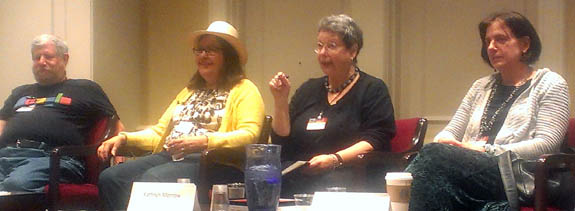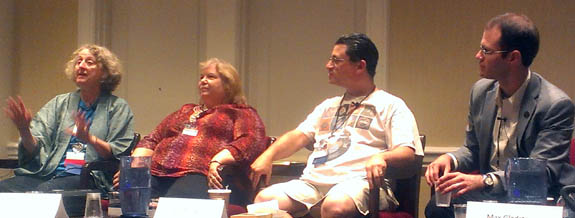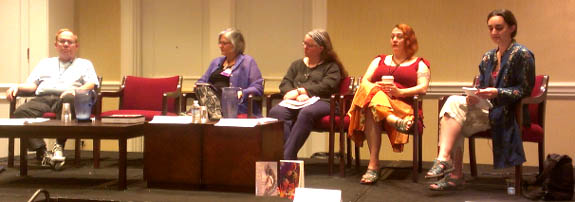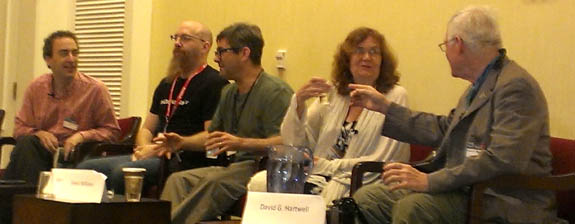Readercon 26 – July 12, 2015 – Sunday
Posted in Convention, Readercon on July 14th, 2015We had planned to leave early on Sunday but, when we looked at the program for the morning and early afternoon we knew we’d be stay ’til 2 pm. So we got up early, packed, took everything out to the car, ate breakfast, and checked out of the hotel. And just made it to our first panel.

9:00 AM – Wish Fulfillment for Happy Adults.
Panelists: John Benson, LJ Cohen, Ann Tonsor Zeddies, Sheila Williams, Betsy Mitchell.
Description: Wish fulfillment for teenagers and wish fulfillment for adults with happy stable lives are necessarily going to be different. Speculative stories are great for navigating the trickiness of coming-of-age, but there’s precious little for those who are already of age and have started to prioritize comfort over adventure. Female readers in particular often turn to romance novels for stories about families and love and kindness, and to mysteries for stories about grown women with agency and purpose. Can speculative fiction draw in those readers by fulfilling different sorts of wishes?
One of the participants said something that struck a nerve with me. As we grow up, we make choices and the choices we make narrows the field. We chose to work for good grades or not. We chose to go to college. We choose a mate and marry. We choose to have or not have children. We choose a career. Each choice narrows the possibilities of the field for the next choice point. Thus, perhaps adults read to see what different choices or different lives than are own would be like.
On the other hand, young people may read to see what might be the results of various choices that they face.
There was the discussion that adults read for comfort and young people read for adventure. I think both — yes, both are true and not true. Personally, I read for my job. But I read for adventure, a change of scene, to gain new ways of looking at things, and for more adventure. I also — when under high stress — turn to stories for the comfort they offer — knowing how it will turn out, enjoying spending time with characters that I like, spending time in a world/time/culture/universe different from my own.

10:00 AM – A Palantir in Every Pocket.
Panelists: Chad Orzel, Daryl Gregory, Ted Chiang, Jeff Hecht, Ken Liu, David Shaw (leader).
Description: In Charles Stross’s “Not a Manifesto,” he writes that the 21st century is “by turns a cyberpunk dystopia and a world where everyone has access to certain kinds of magic. And if you want to explore the human condition under circumstances which might plausibly come to pass, these days the human condition is constrained by technologies so predictably inaccessible that they might as well be magic. So magic makes a great metaphor for probing the human condition. We might not have starships, but there’s a Palantir in every pocket.” This suggests that urban fantasy, which literalizes the “magical” aspects of modern life, provides valuable tools for examining and reflecting the experience of living in the simultaneously glorious and terrible present day. But to what extent does urban fantasy fall prey to uncritically accepting key elements of the here and now instead of exploring and debating them? If urban fantasy is a mirror of the present, are we standing too close to that mirror to see ourselves clearly?
When does technology become so advanced it is considered magic? Or, does all technology we don’t understand seem like magic. Most of us can’t explain how the internet works, but we use it. Does not knowing how something works necessarily mean we’re afraid of it? I don’t think so.
One panelist said something that resonated with me. When I first use some new app or technology, I often try to figure out how it works. I come up with a scheme that makes sense to me with my technical background. Sometimes later I must do some actual digging into code and learn more about it — that’s when I begin to think it’s magic — because a lot of the code doesn’t make sense for what the output is. Eventually, I may have a deeper understanding of what’s under the hood, but in the in between space where my schema and the actuality doesn’t match and the real digging into the bits/bytes begins that where it all looks like smoke and mirrors.
Good panel that raise a lot of interesting ways of looking at technology and our relationship with it.
[Paul’s addition] Both a GPS unit and a pair of 7 league boots are items that anyone can use. Most people have absolutely no idea what goes on inside other than “satellites in orbit” and “spells” respectively. So exactly why is one accepted as Magic, and the other is blithely dismissed as mere technology?

11:00 AM – Who Owns SF?.
Panelist: Jim Freund, Diane Weinstein, Kathryn Morrow (leader), Judith Berman.
Description: Writers, fans, and reviewers can all feel a sense of ownership for the genres they love. But different feelings of ownership from different perspectives can clash, leading to litmus tests, competing definitions, and unresolvable arguments about what lies at the heart of a genre. We’ll examine the ways that social power structures influence the question of who gets to define the genre, and discuss paradigms other than ownership—such as exploration or collaboration—that might help readers overcome their differences and learn how to share.
This panel was an interesting discussion of who has ownership of SF. Nothing was solved but some of the history of SF was brought up to lay some ground work for the discussion. The teapot tempest of the Sad Puppies/Rabid Puppies and the Hugo Nomination Process was touched on also.

12:00 PM – Happy Goldfish Bowl: Concepts of Privacy in Speculative Fiction.
Panelists: Jim Freund (moderator), Tom Purdom, Meriah Crawford, John Benson, Ian Randal Strock.
Description: Speculative stories and novels have explored and challenged the concept of privacy by positing technology, magic, laws, and societal changes that bring shadowed parts of a person’s life or thoughts into the spotlight—or help them stay hidden. Some portray universal openness as the goal (Spider Robinson’s Telempath) while others dread it (Isaac Asimov’s “The Dead Past”). How have depictions of privacy changed over the decades, and how have those depictions influenced the development of privacy-challenging speculative elements such as telepathy and the omnipresent AI?
This topic has been popular lately at conventions and, while the basic topic is the same, the discussion around that base topic seems to differ from convention to convention.
Our privacy is being eroded by technology and ourselves. Some people use all kinds of tactics to avoid others being able to track them on the internet, while others don’t seem to care what is out there in the wild about them. One member of the panel, said that you shouldn’t make it too difficult to find you because if another ‘naughty’ person that has the same name and you can’t be separated from that person by available data you get tarred by the same brush.
On the other hand, it is fairly easy to hide in plain sight as there is so much data that sifting through it for a specific person or item is time consuming and difficult. Aggregate data for groups is easier to deal with — or not.
All in all, a nice discussion with no real conclusions as you’d expect from the topic.

1:00 PM – Transformative Works and the Law and You.
Panelists: Sarah Smith, Toni Kelner, Adam Lipkin, Max Gladstone.
Description: Let’s discuss the state of transformative works today. Copyright law and case law in this area is changing rapidly, as is the way big publishing treats transformative works. Remix culture is the cutting edge of 21st-century creativity, and we are all postmodernists. Is the law finally catching up with that, or lagging far behind? Will the fate of copyright and transformative works ultimately be decided by the whims of corporations and powerful literary estates?
This was basically a panel on copyright. Some of the history of publishing and the differences between European and US copyright was touched on. Also touched on was the issue of using items that are no longer under copyright protection (in the public domain).
Somehow, the discussion veered to a discussion of literary executors and how to protect your works after your death. Some interesting examples of where things can go wrong were pointed out. Suggests that a writer’s literary executor should be one person and that person should be someone familiar with your work and what you want done with it. (Cautionary tale was an author whose family didn’t like what he wrote and will not allow reprints.)
Again, a good discussion that opens up new things to think about.
All in all, we had a good time at Readercon and signed up for next year before we left. Next year is in a new hotel.









